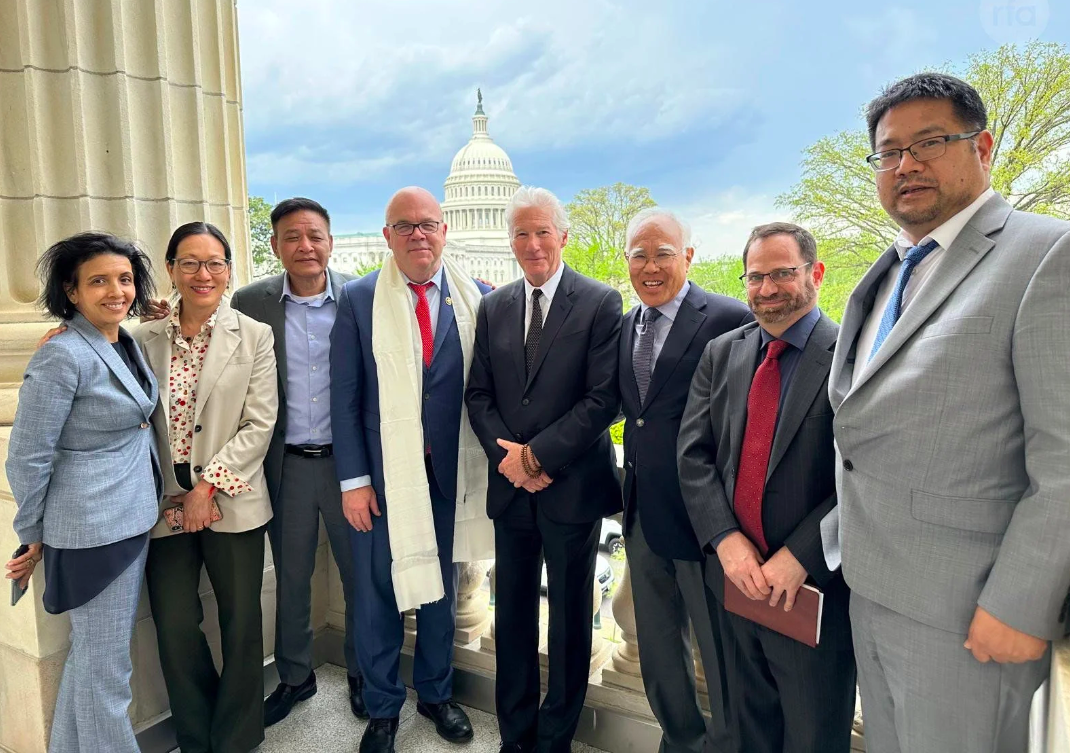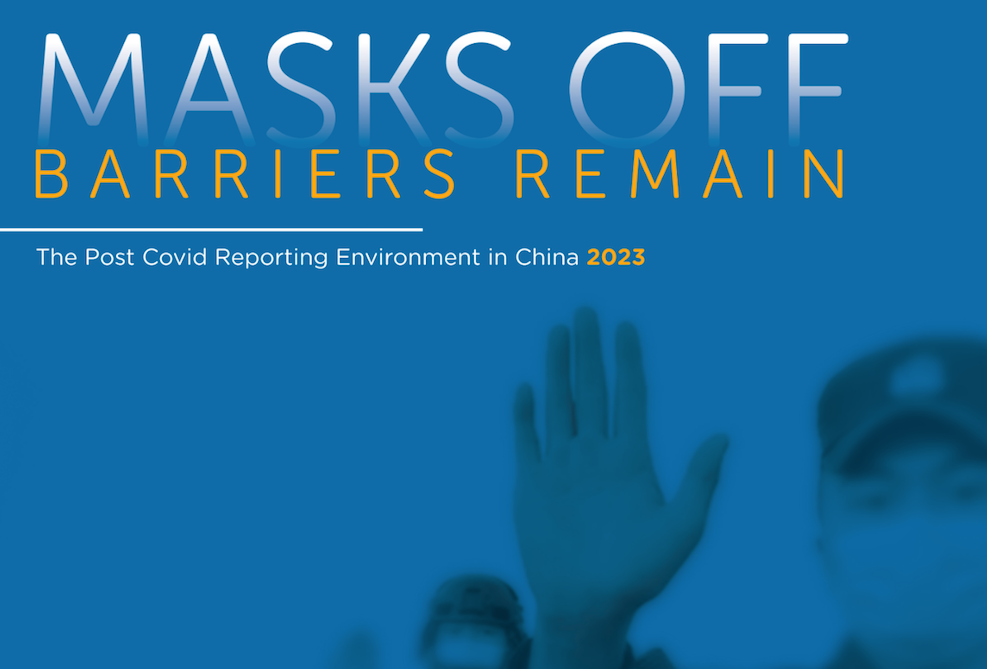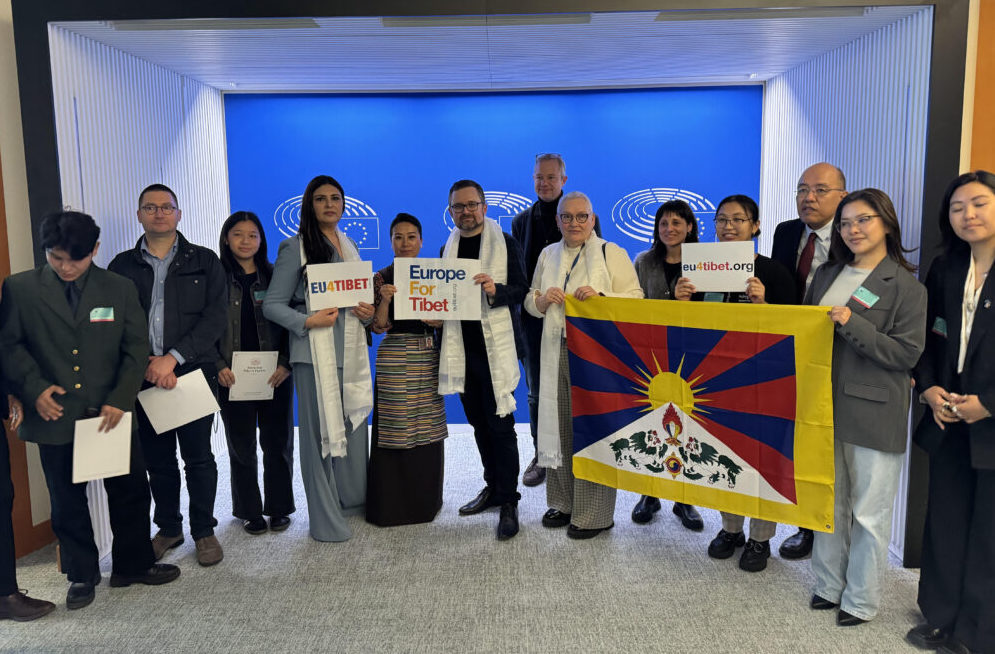Full transcript of Luke Harding’s interview with the Dalai Lama
Guardian: The Chinese governor of Tibet has said he is resolutely opposed to your trip to see President Bush this week. Why are you going to the US and why is Beijing so irritated by your meeting?
Dalai Lama: Actually the visit to the US was due last year, but because of [my] illness it was postponed. There are so many invitations from universities and also some teaching. The main thing is a few days’ teaching in New York. I have no particular point to discuss or to request from the US government. In the meantime whenever I have an opportunity of meeting political leaders I’m happy.
Guardian: But this is the world’s most powerful man?
Dalai Lama: It’s nothing special. I’m having one day at Harvard and two days at MIT meeting with some scientists. Personally I have most interest in meeting the scientists. I’m also receiving two or three honorary degrees. This [Chinese condemnation] is almost a routine thing. In the past, whenever a university gave me some award or something, the university received protests from Chinese missions in Europe and America. Recently that now seems lesser.
Guardian: I wanted to ask about negotiations going on between your envoys and Beijing. Your envoys have made two recent trips to China, in September 2002 and in late May. For the outsider it is quite hard to tell what is going on. Are these negotiations meaningful?
Dalai Lama: Of course the Tibet issue is a very complicated issue. And naturally for the Chinese side also. In order to solve this issue the Chinese have adopted various policies for more than 50 years.
Things are very complicated. I think now the most important thing is we believe [that for] any issue the best solution is through dialogue. So in our case the Tibetan problem must find a solution through dialogue … a mutually agreeable solution. Our position is not seeking independence, but seeking genuine autonomy, which the Chinese constitution mentions. The problem is not implementing [it] properly – although the constitution mentions that Tibet is unlike other provinces and is supposed to enjoy autonomy. In 1956 Chou En Lai told the Indian prime minister Jarwarhal Nehru the Chinese government considered Tibet case as something very special.
Now today the unity of Tibet is most repressed … and more restrictions. Many Tibetans who visit China, for business or whatever way, when they reach proper China they find much more freedom. The Tibet case is much worse. Today the special meaning is a negative sense as opposed to the positive one.
To answer your question, since 1979 we developed direct contact with Chinese government. In the early 80s there was real hope. The atmosphere was very positive. Then around the mid-80s the Chinese government’s attitude changed towards students demonstrating for democracy. The Chinese government adopted a more and more harsh attitude. In the meantime their attitude towards Tibet also became harsh. In 1993 contact stopped. Last year we developed some semi-official channel but that didn’t develop into anything substantial.
Then finally last September we renewed or revived once more direct contact with the Chinese government. We consider that is good. And that atmosphere of our [first] visit there was quite positive. The second visit recently that also seemed the same sort of atmosphere, even better. So up to now we are just beginning contact. But we have not yet started serious discussion. From this moment I believe it is very essential to develop confidence. This is the moment to try and build confidence and understanding.
Guardian: Do you see any sign of Beijing being prepared to make concessions?
Dalai Lama: Too early to say. What my concern is now since direct contact developed exactly one year, inside Tibet the situation is not at all improving. That is my major concern. But meantime of course it is understandable that things don’t go very quickly. It takes time.
Guardian: Why after this long period of no contact do you think Beijing wants to renew official contact with you? What is happening inside China? Is it the change in leadership, international pressure, the Olympics, or something else?
Dalai Lama: Difficult to say. I think many factors. I cannot say. There is no point in guessing. That’s your responsibility. If more people inquire, then perhaps the picture may became clearer [laughs]. I believe at global level recently over the last 10 or 15 years much has changed. The communist totalitarian regimes are now no longer in Moscow and all the eastern European countries have all got freedom.
It’s a big change. There are a few pockets of communism here or there. But at a global level people realise communist totalitarianism can no longer work. China is itself much changed – so far mainly in economy and education. Naturally with better education facilities, better education, things will change.
Now I think the majority of the communist party members don’t have any genuine belief in communist ideology. It’s simply for a job they join the communist party, without genuine belief – unlike the 1950s, when I was in China. I found the communist party members were really dedicated to their beliefs. They were fully convinced of their ideology, of a future classless society. It’s no longer there.
In the meantime they are very keen to adopt a western market economy. With that a lot of other unhappiness is coming. It’s difficult for China to provide a meaningful ideology. There is a lot of confusion there.
So I think China is changing – is using common sense rather than fixed ideas. This is now coming. Chinese intellectuals now begin to realise their the policy regarding so-called minorities is not properly working. It’s in China’s own interest to be critical about the current China policy. Therefore I’m very, very optimistic.
Guardian: One of the things that has been floated, also from the Chinese side, is your return to Lhasa. Do you think that might happen? Would you like to return to Tibet? And under what circumstances would you go back?
Dalai Lama: I expressed my desire to visit Tibet in 1983. That exact year we had another delegation visit China. Then we planned in 1984 a further delegation mainly for preparation of my visit [to Tibet] in 1985.
The Chinese government then didn’t allow the 1984 delegation. So my planned visit didn’t materialise.
In the early 1990s I expressed my wish to visit Tibet but then also not allowed. Another place I want to visit are those sacred [Buddhist] places inside China itself. I first expressed that desire back in 1954 because Tibetans and Mongolians are keen to visit these holy places.
Back in the 1950s a delegation visited that sacred place. So I expressed to the concerned Chinese department [a desire to go as well]. They told me: “The road is very bad.” [laughs] That was in 1954. Since this Dalai Lama is the same person, so same desire.
Still I want to go there, that holy place. So now I’m hopeful both to visit Tibet, see my own place with my old eyes, and try to cool down the situation. You ask me under what circumstances? The Chinese government should give me a green light, without complicated pre-conditions.
Guardian: I know you have said it’s up to the Tibetan people to decide whether you have a successor. But the reality is that after your death the Chinese will produce their own Dalai Lama very quickly and say: “This is the next Dalai Lama.” Do you think that if you have a successor he should be born outside China?
Dalai Lama: Some years ago I said that if I die under [the] present circumstances, we are still carrying on a struggle. Under those circumstances – my reincarnation will logically be outside in a free country because the very purpose of the reincarnation is to fulfil the task started by the previous life.
If the Tibetan people want another Dalai Lama then logically the Dalai Lama will be in another country. In the meantime the Chinese might appoint a young boy like the Panchen Lama – a lucky boy [laughs] – and give him official Dalai Lama status and position. That’s OK. But the Tibetans will not respect him. He will not have any influence.
Guardian: You have also suggested in the past that you are the last Dalai Lama?
Dalai Lama: That’s absolutely wrong. The institution of the Dalai Lama has been going on for the last 500 years. But for the last 200 years the Dalai Lama institution is just like any other Lama. The Dalai Lama is just a temporal leader of Tibet.
We had an elected political leadership two years ago. The Dalai Lama institution leader is no longer automatically the head of the Tibet political leadership. Now I’m in a position of semi-retirement. When I die that’s permanent retirement [laughs]. If I die today – suppose, tonight [laughs] – you get some hot news. Most probably the Tibetans want another Dalai Lama. That’s quite sure, I think.
Then also if I die tonight it will be a little chaotic for a few months. Naturally it will be a serious setback. But this is our struggle, it’s our nation’s, with a long history and a sophisticated cultural heritage. So starting with the Tibetan youth not outside but inside the Tibetan spirit is very strong, very strong.
Guardian: You mention going back to Lhasa. If you look back to your childhood in Tibet, growing up as a child and a young adult, what do you miss most?
Dalai Lama: My happiest time? Whenever I got a holiday without lessons that was one of the happiest moments [laughs]. Occasionally my mother came and visited me with her homemade bread.
Of course as a very young boy I was very happy. Since my immediate elder brother separated from me and he then entered school in Lhasa, since I was a very young age I always played with him. When he departed from me I was eight or 10 – I can’t remember – I was very sad. Every fortnight he got a holiday from school so he would come to see me. These every two weeks that was a happy moment.
But I think generally there was much happiness when I was young. The main concern was study and holiday. Of course around 13 or 14 the more serious study started. That gave me more awareness. Then around 16 the responsibility [of being Dalai Lama] came on my shoulders. Since then more than fifty years have past but still I have survived in high spirits [laughs]. Not much worry. Of course anxiety comes and goes.
Guardian: Looking back over the past 50 years, do you think you made any mistakes?’
Dalai Lama: That’s a silly question [laughs]. The past is past. It’s finished. I regret my study when I was 10 to 15 to 20 – that period of study. Although I did some effort it was not sufficient. I can’t remember a serious mistake. But I think when I look back over 50 years at major decisions I’ve made in the political field, that when I take the decision sometimes there is a little hesitation, a little doubt. But then time passes and all becomes the right decision.
Guardian: You said in a recent interview with the Readers’ Digest that you felt you had missed out on certain things, for example by being celibate. What’s the best thing about being Dalai Lama and what’s the worst?
Dalai Lama: The best thing with the name is more opportunity to serve people: the Tibetan people, then also people from Mongolia, and people not in India but the Himalayan range. That’s the best, most positive side.
Guardian: And the worst thing about being you?
Dalai Lama: There is a negative side. In the political field because of my name the Chinese consider a normal movement to be something political. If I didn’t have the Dalai Lama’s name I would have more freedom.
You mention the Readers’ Digest – [laughs] They asked me and I pointed here [Dalai Lama points to his groin]. It was half a joke. I explained that sexual desire is a biological factor. Emotionally from a Buddhist view point there are two factors [involved in avoiding sexual desire]. Around 15 or 16 I developed a more serious interest in spiritual practice, which is a counter-measure for sexual desire.
Then I think there is biological factor. Buddhist monks don’t eat in the afternoons. They have no solid food. I think this helps to do away with sexual desire. We’ve also heard those stories and complaints about those lay people who have got married. There are a lot of problems.
Many of my American friends when I come for a second or third visit they have a new friend or are divorced – sometimes with children. Those get married who have no children they worry about their children. Those who have plenty of children are worried because they have too many. Then there is abortion, whether sinful or OK. There are a lot of complications.
Guardian: So sex brings complications?
Dalai Lama: At the beginning when the child is coming people worry the child may be deformed. When a healthy boy or child comes people are very happy for a short moment. My translator was previously a monk. He recently disrobed. One time he told me that since he had a child his sleep is always disturbed [laughs]. Of course for a short moment people think “oh sex” and are very happy.
But generally speaking I think [sex brings] too much ups and downs. When I think about it I really feel I’m very fortunate. In my dream on many occasions I feel I’m a monk. I never feel I’m Dalai Lama in my dream. That means monk is very dear in my mind. So my instrument is useless [laughs]. It has no purpose, no meaning. [laughs]
Guardian: Last year you were unwell. What was wrong with you, and are you OK now?
Dalai Lama: Whenever Chinese officials visit me this is always the first question they always seem to ask [laughs]. Before I got ill in Tibet and also in China there was a rumour that the Dalai Lama had cancer.
There was also another story. I was in a car accident thee or four years ago. The Chinese heard the rumour that I had broken two ribs and was always bleeding as a result. But during those periods I was healthy. No problem.
Then two years ago I had a serious illness in my intestine. At that time on one occasion I heard there was a meeting in Lhasa and that one official said: The Dalai Lama is pretending to be sick and has postponed a festival so he can get sympathy for the Tibetan community.
At that time a few weeks before that illness I took some Tibetan medicine for [my] liver. It’s also for gall bladder. That affected my stomach. That was one factor. But the immediate factor when I took a pilgrimage I had to climb several steps.
Usually because it’s our belief that the harder the pilgrimage the more your sin is purified. So I walked with a stick. The Indian liaison officer with me said I looked like Gandhi. When I was coming down I was taking strong steps there was some kind of vibration inside my stomach. That night pain started in my stomach. It was very painful, very painful. So now that’s completely cured.
Guardian: Can I tell your Chinese friends that you’re completely cured and healthy?
Dalai Lama: Yeah [laughs]. I think one reason is after that illness in February and March, that in April I rested. In May I visited Australia and New Zealand for two weeks. It was quite hectic. But there was no feeling of tiredness. So that means I’m completely cured. But I am getting older and older. I’m now 69. I might have another 20 years, 30 years or 40 years to go. I don’t know.









